This article and associated images are based on a poster originally authored by Ulrike Künzel, Chun Hao Wong, Erica Bello, Antigoni Gogolou, Shaun Maguire, Ben Pearson, Davide Gianni, Coralie Viollet, Ceri Wiggins and Nicola McCarthy and presented at ELRIG Drug Discovery 2024 in affiliation with AstraZeneca and the University of Cambridge.
This poster is being hosted on this website in its raw form, without modifications. It has not undergone peer review but has been reviewed to meet AZoNetwork's editorial quality standards. The information contained is for informational purposes only and should not be considered validated by independent peer assessment.

Collaborative effort in functional genomics
- A new academic-industry partnership between the Medical Research Council (MRC), Astra Zeneca, and the University of Cambridge.
- Hosted at the Milner Therapeutics Institute (MTI)
- Part of the UK’s Human Functional Genomics Initiative, contributing to the UK’s ambition of having the world's most advanced genomic healthcare system.
- Opportunity to access the arrayed screening platform for UK-based academic researchers and small and medium-sized enterprises
- A collaborative effort to identify novel genes and therapeutic targets implicated in tissue development and disease etiology
Arrayed CRISPR screening facilitates multiplexing of complex phenotypic endpoints
- One gene is targeted in each well of microwell plates (e.g., 96- or 384-well plate), enabling straightforward genotype-phenotype association.
- It is highly compatible with high-content endpoints, such as morphological imaging, flow cytometry, or other plate-based phenotypic assays (e.g., ELISA).
- Screen can be performed from tens of genes up to whole genome scale (~19,000)
Focus on complex human disease cellular models
- We will consider applications that cover human in vitro models outside of oncology:
- Co-culture models
- Organoids and 3D models
- Primary or iPSC-derived cells
- Models need to be genetically tractable (e.g., have been successfully perturbed using CRISPR, siRNA, or shRNA) and scalable, with enough material provided or produced through culture.
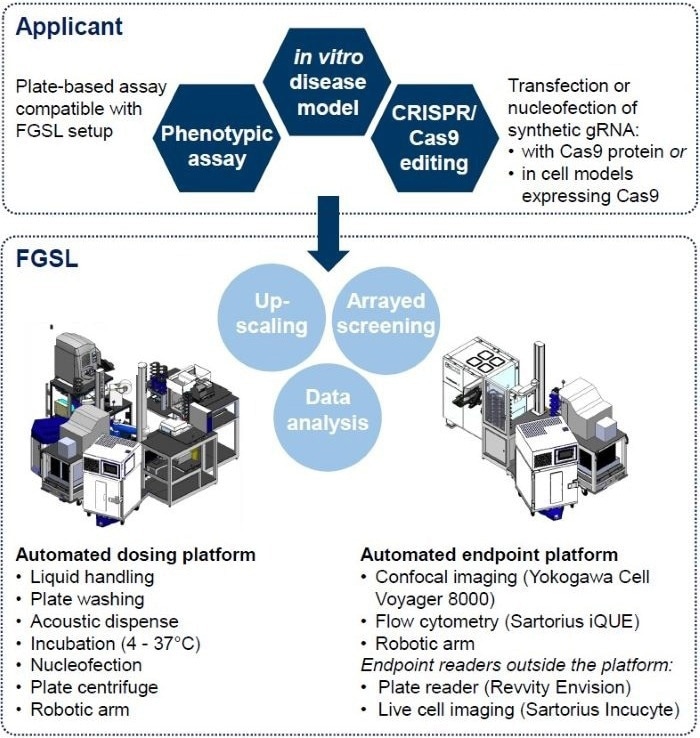
Figure 1. Workflow for arrayed CRISPR screens at the FGSL. Image Credit: Image courtesy of Ulrike Künzel et al., in partnership with ELRIG (UK) Ltd.
Application process, reviews and expected outcomes
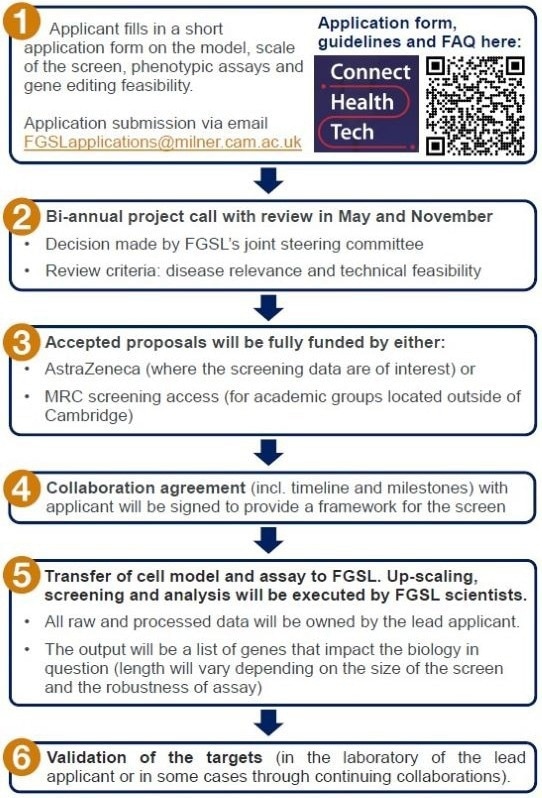
Image Credit: Image courtesy of Ulrike Künzel et al., in partnership with ELRIG (UK) Ltd.
First round of applications: Eight proposals received
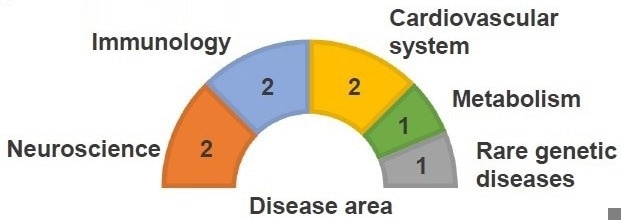
Image Credit: Image courtesy of Ulrike Künzel et al., in partnership with ELRIG (UK) Ltd.
About AstraZeneca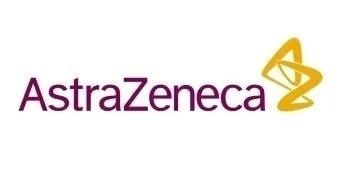
AstraZeneca is a global, science-led patient-focused pharmaceutical company that focuses on transforming the future of healthcare by unlocking the power of what science can do for people, society and the planet.
About ELRIG (UK) Ltd.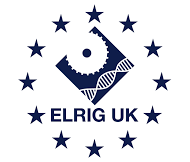
The European Laboratory Research & Innovation Group (ELRIG) is a leading European not-for-profit organization that exists to provide outstanding scientific content to the life science community. The foundation of the organization is based on the use and application of automation, robotics and instrumentation in life science laboratories, but over time, we have evolved to respond to the needs of biopharma by developing scientific programmes that focus on cutting-edge research areas that have the potential to revolutionize drug discovery.
Comprised of a global community of over 12,000 life science professionals, participating in our events, whether it be at one of our scientific conferences or one of our networking meetings, will enable any of our community to exchange information, within disciplines and across academic and biopharmaceutical organizations, on an open access basis, as all our events are free-of-charge to attend!
Our values
Our values are to always ensure the highest quality of content and that content will be made readily accessible to all, and that we will always be an inclusive organization, serving a diverse scientific network. In addition, ELRIG will always be a volunteer led organization, run by and for the life sciences community, on a not-for-profit basis.
Our purpose
ELRIG is a company whose purpose is to bring the life science and drug discovery communities together to learn, share, connect, innovate and collaborate, on an open access basis. We achieve this through the provision of world class conferences, networking events, webinars and digital content.
Sponsored Content Policy: News-Medical.net publishes articles and related content that may be derived from sources where we have existing commercial relationships, provided such content adds value to the core editorial ethos of News-Medical.Net which is to educate and inform site visitors interested in medical research, science, medical devices and treatments.
Last Updated: Nov 18, 2024